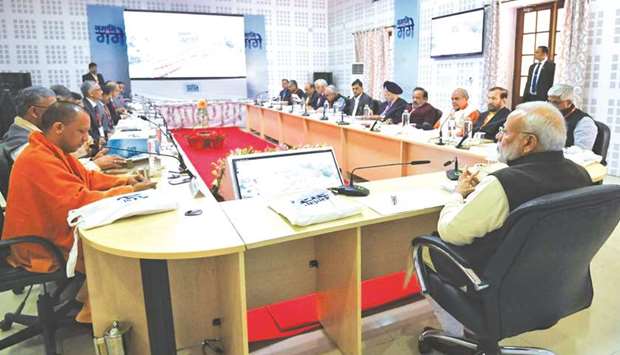Prime Minister Narendra Modi has said the River Ganga rejuvenation should be an example of co-operative federalism and it has been a long-pending challenge.
The prime minister made this observation at the first meeting of the National Ganga Council in Kanpur, Uttar Pradesh, yesterday. The meeting was aimed at reinforcing the importance of a Ganga-centric approach in all departments of the states concerned as well as relevant
central ministries.
He also asked for formation of a digital dashboard where data from villages and urban bodies would be monitored on a daily basis by the Niti Ayog and the Ministry of Jal Shakti. All districts bordering Ganga should be made a focus area for monitoring efforts under the Namami Gange project, he said.
Modi said a lot had been accomplished since the government took up ‘Namami Gange’ in 2014 as a comprehensive initiative, integrating various government efforts and activities, with the aim of reducing pollution, and conservation and rejuvenation of Ganga.
Notable achievements had been zero waste creation by paper mills and reduction in pollution from tanneries, he said and added, but a lot was required to be done.
The prime minister emphasised that improvement would require full co-operation from the public at large and greater awareness through dissemination of best practices from cities situated along the banks of
national rivers.
“For the first time, the central government has made a commitment of Rs20,000 crore for 2015-20 to the five states through which Ganga passes, to ensure adequate as well as uninterrupted water flow. Rs7,700 crore has been spent, prominently for construction of new sewage treatment plants,” said a government statement.
The prime minister also urged for a holistic thinking process where ‘Namami Gange’ would evolved into ‘Arth Ganga’ or a sustainable development model with a focus on economic
activities related to Ganga.
“As part of this process, farmers should be encouraged to engage in sustainable agriculture practices, including zero budget farming, planting of fruit trees and building plant nurseries along the banks of Ganga. Priority could be given to women self-help groups and ex-servicemen organisations for these
programmes,” it added.
The meeting discussed tapping the hybrid tourism potential of the river basin area for religious and adventure tourism. “The income generated from encouraging eco-tourism and Ganga wildlife conservation and cruise tourism would help generate sustainable income streams for cleaning of Ganga,” the government said.
The meeting was attended by Union Ministers for Jal Shakti, Environment, Agriculture and Rural Development, Health, Urban Affairs, Power, Tourism, Shipping, and the Chief Ministers of UP and Uttarakhand, the Deputy Chief Minister of Bihar, the Vice-Chairman of the Niti Aayog and other senior officials.

Prime Minister Narendra Modi presides over the first National Ganga Council meeting where he also reviewed the ‘Namami Gange’ project and its firsthand experience of the impact of the programme on the river, in Kanpur yesterday.
